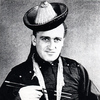A bag with about 270 chess pieces, carved and painted wood. Mongolia, 19th Century or older.
Not complete sets, depicting animals, people, symbols and figures. Some painted. Height 2-7,5 cm.
Provenance: Formerly in the collection of Danish Archaeologist, Ethnographer, Art Collector and Museum Director Werner Jacobsen (1914-79). For more information, see below.
Wear, damages.
Provenance
Formerly in the collection of Danish Archaeologist, Ethnographer, Art Collector and Museum Director Werner Jacobsen (1914-79). Jacobsen studied archeology and participated 1938-39 in the Danish Royal Geografic Societys Expedition to Mongolia under the lead of Henning Haslund-Christensens.
During the years 1946-59 he lived in India and Nepal and acquired many pieces for National Museum in Denmark, The Royal Library, the Moesgård Museum and himself. He set up a scientific center in Kathmandu, Nepal and later in Denmark where he organized all the material and information he had gathered.
In 1940-45 he was employed the Danish National Museum, in 1961 he became Museum Director for the Etnografic Collection. 1963-78 he was the head of the information and educational Department at the Museum. The collection was acquired from Werner Jacobsen as a whole when he sold it to gather funds for new expeditions. Thence by descent to the present owner.
Literature
Werner Jacobsen published various literary and academic works such as; Bronzer fra Mongoliet, Köpenhamn, 1940, Some Observations on the Origin of Sino-sibirian Animal Bronzes, Köpenhamn 1941, Buddhsitisk Skulptur I Kina, Köpenhamn, 1941, Kabuki, det Japanska folks teater, Köpenhamn 1941, Todaerne, - en idisk bjergstamme, Köpenhamn 1949, Maleri fra Puri, Orissa, Indien, Köpenhamn 1961, Thailand, Arkeologi og Kunst, Köpenhamn 1961. Originale Bloktryk fra Nepal, Köpehamn, 1966, Asiatiske Akkorder, Köpenhamn 1965, Buddha og det modern menneske, Köpenhamn, 1970, Kunsten, kunstneren og inderen, Köpenhamn, 1970, Den hvide mans byrde, Köpenhamn, 1970, Hvad er den egentlige virkelighed, Köpenhamn, 1976, Den hvide gud, Köpenhamn, 1973.
More information
The Mongol tradition utilizes a great variety of forms, and each set selectively represents its particular clan. The sets are handed down from one generation to the next.
Throughout history Mongolians have maintained a very high regard for the game of chess – it embodies strategy, wisdom and adversity. Mongolian chess exists in two variants and the Mongolian names for them are as follows: the little one – shatar, the big one – hiashatar. The word “shatar” derives from name of Arabian chess “shatranj”. Presumably since the chess game came to Mongolia from Arabia through Iran and along the ancient Silk Road
Werner Jacobsen was a chessplayer and used to play the people he met for their chess sets. These are some of the ones he brought back from his travel.

































